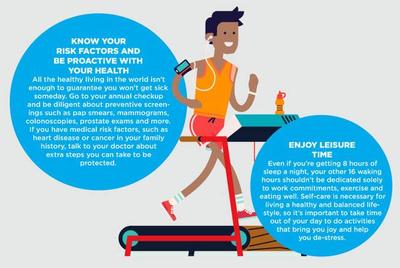Have you ever wondered how staying fit can truly change your daily life? Fitness is more than just looking good—it affects how you feel, think, and handle every single day.
When you make fitness a part of your routine, you unlock energy, focus, and confidence that ripple into every corner of your life. Keep reading to discover why fitness isn’t just a choice but a powerful tool that can transform your everyday living in ways you might not expect.

Credit: mountainview-medical.com
Benefits Of Daily Fitness
Daily fitness brings many benefits that improve life quality. It helps the body and mind work better every day. Small exercises can make a big difference in health and mood.
Even a short walk or stretch boosts how you feel. Fitness also supports your body’s strength and energy. Consistent activity helps keep illnesses away and improves daily tasks.
Boosting Energy Levels
Exercise increases blood flow and oxygen to the body. This helps muscles and organs work well. People feel more awake and less tired after moving regularly.
Daily fitness trains the body to use energy better. It reduces fatigue and builds stamina. Simple activities like walking or cycling raise energy for hours.
Enhancing Mental Health
Physical activity releases chemicals that lift mood. It lowers stress, anxiety, and feelings of sadness. Exercise creates a sense of calm and happiness.
Regular fitness improves focus and memory. It helps clear the mind and reduce mental fatigue. Moving your body daily supports emotional balance and peace.
Improving Sleep Quality
Exercise helps the body relax and prepare for rest. People who move often fall asleep faster. They also enjoy deeper, more restful sleep.
Good sleep boosts recovery and overall health. Fitness supports a natural sleep cycle and reduces insomnia. Daily movement makes waking up easier and more refreshing.
Fitness And Physical Health
Fitness plays a key role in keeping the body healthy. It helps the body work well every day. Physical health depends a lot on regular activity. Exercise improves how the heart, muscles, and lungs function. It also helps the body fight illness and stay strong.
Strengthening The Heart
Exercise makes the heart pump blood better. A strong heart pushes blood easily to the whole body. It lowers the risk of heart attacks and strokes. Regular activity keeps blood vessels clear and flexible. This helps blood flow smoothly and reduces pressure.
Supporting Weight Management
Moving the body burns calories and fat. It helps keep weight in a healthy range. Maintaining weight lowers stress on bones and joints. Fitness also builds muscle, which burns more calories. Healthy weight reduces the chance of health problems later.
Reducing Risk Of Chronic Diseases
Active people have a lower chance of many diseases. Exercise helps control blood sugar and cholesterol levels. It lowers the risk of diabetes, cancer, and arthritis. Physical activity boosts the immune system too. Staying fit protects the body from long-term sickness.
Impact On Productivity
Fitness plays a big role in how well people work every day. It helps the body and mind stay strong. This strength improves how tasks are done and how fast work gets finished. Being fit affects many parts of productivity. It keeps the brain sharp and energy high. The following points explain the key ways fitness boosts productivity.
Increasing Focus And Concentration
Exercise helps the brain stay alert and clear. Physical activity sends more oxygen to the brain. This oxygen improves thinking and memory. People who exercise often find it easier to focus on tasks. Their mind stays on track without getting distracted. Short breaks for movement can refresh the brain. This leads to better work results and faster problem-solving.
Enhancing Mood And Motivation
Fitness also lifts mood by releasing feel-good chemicals. These chemicals reduce stress and anxiety. A good mood makes work feel less tiring. Motivation grows as energy levels rise. Regular exercise builds confidence and a positive mindset. This mindset helps people start and finish tasks. Feeling good supports a steady and strong work pace.
Social And Emotional Advantages
Fitness does more than strengthen the body. It also boosts social and emotional well-being. Regular exercise helps people feel happier and more connected to others. The positive effects reach deep into daily life, improving mood and building strong relationships.
Building Confidence
Exercise helps build self-confidence. Achieving fitness goals gives a sense of pride. People feel better about their appearance and abilities. This confidence spreads to other parts of life. It helps in work, school, and social settings. Feeling good inside shows on the outside.
Encouraging Social Interaction
Fitness often involves group activities or classes. These settings create chances to meet new people. Sharing a common goal brings people closer. Social interaction reduces feelings of loneliness. It strengthens friendships and support networks. Staying active can improve both body and social life.
Incorporating Fitness Into Daily Life
Incorporating fitness into daily life improves health and mood. Small changes create big results over time. Moving more helps the body stay strong and the mind clear. It can be easy to add simple activities even with a busy day.
Finding ways to exercise without needing extra time or equipment works best. Consistency matters more than intensity. Building fitness into routines makes it a natural part of life. Everyone benefits from regular movement, no matter the age or skill level.
Simple Exercises For Busy Schedules
Short workouts fit well into tight days. Walking or jogging around the block takes just 10 minutes. Stretching at your desk reduces stiffness and improves focus. Bodyweight exercises like squats and push-ups need no gym. Using stairs instead of elevators adds activity without extra effort.
Try quick routines before breakfast or after work. These moments boost energy and reduce stress. The key is to move often, even for a few minutes. Every bit counts and adds up through the day.
Creating Sustainable Habits
Start with small, easy goals to build momentum. Make exercise a daily habit by choosing a fixed time. Pair workouts with daily tasks, such as walking while on phone calls. Track progress to stay motivated and celebrate small wins.
Consistency beats intensity for long-term success. Find activities you enjoy to keep going. Avoid pushing too hard too soon. Slow, steady progress creates habits that last. Over time, fitness becomes a natural part of daily life.

Credit: www.emedicinehealth.com
Unlocking Long-term Vitality
Fitness plays a key role in keeping your body strong and healthy for many years. It helps the body work well and fight off illness. Staying active shapes your life positively. It gives you more energy and helps you feel good every day.
Long-term vitality means living with strength and good health as you age. Fitness supports this by improving muscles, bones, and the heart. It also keeps the mind sharp and reduces stress. This leads to a better quality of life over time.
Maintaining Independence With Age
Regular exercise helps you keep control of daily tasks. Simple activities like walking, climbing stairs, or carrying groceries become easier. Strong muscles and good balance reduce the risk of falls.
Good fitness means fewer health problems. It lowers chances of diseases that limit movement. Staying active allows you to live without relying too much on others. This freedom is very important for happiness and confidence.
Promoting Longevity
Fitness supports a longer life by protecting the heart and lungs. It helps control weight and blood sugar. These factors reduce the risk of serious illnesses like diabetes and heart disease.
Exercise also improves sleep and mood. Both are important for staying healthy. People who stay active tend to live longer and feel better in their bodies.

Credit: www.guardian.in
Frequently Asked Questions
What Are The Main Benefits Of Fitness In Daily Life?
Fitness improves energy, mood, and overall health. It boosts immunity and reduces stress. Regular exercise supports better sleep and mental clarity.
How Does Fitness Impact Mental Health Daily?
Physical activity releases endorphins that enhance mood. It reduces anxiety and depression symptoms. Fitness also improves focus and cognitive function.
Why Is Fitness Important For Productivity?
Fitness increases energy levels and reduces fatigue. It enhances concentration and decision-making skills. Regular exercise helps maintain motivation throughout the day.
Can Fitness Improve Quality Of Life?
Yes, fitness enhances physical strength and flexibility. It promotes healthy weight and prevents chronic diseases. Active living leads to longer, happier life.
Conclusion
Fitness plays a key role in everyday life. It helps keep your body strong and healthy. Regular exercise boosts energy and improves mood. It also helps prevent many common illnesses. Staying active makes daily tasks easier to do. Good fitness supports better sleep and sharper focus.
Small steps each day can lead to big changes. Choose activities you enjoy to stay motivated. Fitness is not just for athletes; it’s for everyone. A healthy body leads to a happier life. Keep moving and feel the difference yourself.
